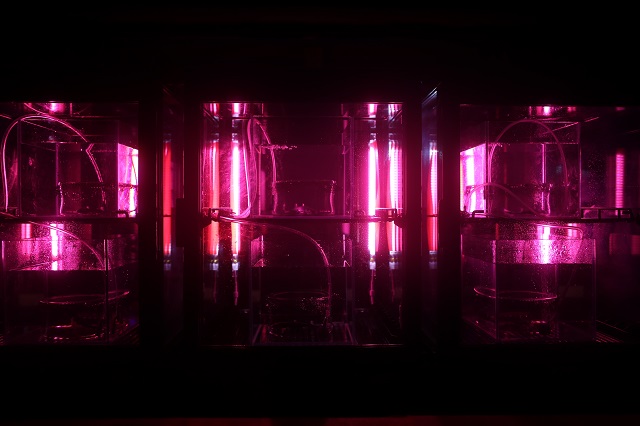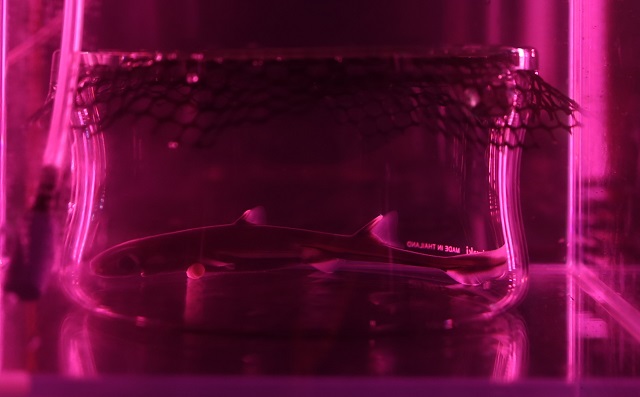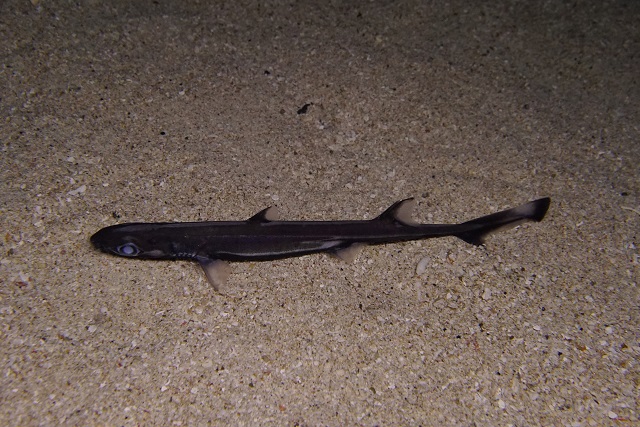Topics
2023.12.29
The exhibit of a deep-sea shark embryo growing in an artificial uterus apparatus for sharks has begun.
This exhibit has ended.
The exhibit of a deep-sea shark embryo (Mollers lantern shark) growing in an artificial uterus apparatus for sharks has begun.
The embryo of a deep-sea shark (Mollers lantern shark) is now exhibited at the Shark Research Lab. This embryo has been growing in an artificial uterus apparatus for sharks since the beginning of December 2023. If you look through the peephole, you can observe the embryo developing inside the dimly lit apparatus. Don’t miss this amazing opportunity.

The external appearance of the artificial uterus apparatus

The embryo of the Mollers lantern shark grows as it absorbs yolk in the artificial uterus apparatus.
(The round object at the front of the image is the yolk.)
Exhibit duration
2023 December 29th-2024 January 31st
※The shark embryo continues to develop smoothly and is scheduled to artificially hatch at the end of January 2024.
The exhibit of the shark embryo in an artificial uterus apparatus will end on January 29th (Mon), 2024.
Place of exhibit
Okinawa Churaumi Aquarium ”Shark Research Lab”
<What is an artificial uterus apparatus for sharks>
It recreates the environment of a shark uterus, which is one of several shark reproduction modes, and the embryo develops in the artificial uterus apparatus.
Our facility developed this method, and have bred and reared sharks and rays for over 40 years, including bull sharks and Alfred mantas. (The international patent application for the artificial uterus apparatus for sharks is currently in process.)
≪More details on the artificial uterus apparatus can be found here≫
A world’s first! The successful development and artificial birth of a deep-sea luminescent Mollers lantern shark embryo using an artificial uterus apparatus!

<Mollers lantern shark>
Scientific name:Etmopterus molleri
This deep-sea shark, reaching 50 cm in length, lives at depths of around 500 meters in Okinawan waters. It is bioluminescent and is known as the glowing shark, as its body luminesces bluish white. It is extremely difficult to rear with no precedence of successful long-term rearing. It is a viviparous species. Currently, embryos raised in the artificial uterus apparatus since April 2022 are being exhibited.
Surveys and conservation of Okinawa’s biodiversity are conducted by Okinawa Churaumi Aquarium. In recent years, the numbers of rare shark species are decreasing, so we hope to continue to help shed light on their reproductive ecology.
Special cooperation
Museum of Maritime Science [Marine Studies Museum Support]
Inquiries
Okinawa Churaumi Aquarium
905-0206
424 Ishikawa, Motobu-cho, Kunigami-gun, Okinawa Prefecture
TEL:+81-980-48-3748
FAX:+81-980-48-4444

